Kay Ivey awards $82.45 million in broadband grants to Middle-Mile project

On Tuesday, Gov. Kay Ivey awarded an $82.45 million grant to help make statewide broadband service availability more attainable for more people across Alabama. Ivey made the announcement at the Central Alabama Electric Cooperative headquarters building just North of Prattville. “Achieving full broadband coverage is a journey, not a short trip, and today is an important step toward completing that journey,” Gov. Ivey stated. “The Alabama Middle-Mile project – the infrastructure setting part of this journey – is going to lead our state to be the model for the nation when it comes to providing broadband capabilities. In 2022, being able to be connected at home, work, or on the go is absolutely necessary, and this is certainly key to making that a reality.” Gov. Ivey explained that the funds will be used by Fiber Utility Network, a corporation formed by eight rural electric cooperatives to fund a “middle-mile” broadband network that will have a statewide impact. The eight co-ops include Central Alabama, Coosa Valley, Covington, Cullman, Joe Wheeler, North Alabama, PowerSouth, and Tombigbee. Ivey was joined at the event by state leaders, including Speaker of the House Mac McCutcheon (R-Monrovia), President Pro Tem of the Alabama Senate Greg Reed (R-Jasper), State Senate Majority Leader Clay Scofield (R-Guntersville), Senate Minority Leader Bobby Singleton (D-Greensboro), State Rep. Randall Shedd (R-Baileytown), and Alabama Department of Economic and Community Affairs (ADECA) Director Kenneth Boswell. “The project is the springboard to supplying broadband services for rural residents, businesses, educational facilities, and other community anchors,” said Director Boswell. “I commend the Fiber Utility Network for their willingness to undertake this necessary step to ensure more Alabamians have access to these services.” ADECA is administering the award through its Alabama Digital Expansion Division, which the Legislature created in order to identify projects that will expand broadband access in Alabama. “In terms of broadband, this is a great leap forward,” said Sen. Scofield, chairman of the Alabama Digital Expansion Authority board. “Governor, you really are America’s broadband governor, and we can’t thank you enough.” “Connectivity is really the great equalizer,” Scofield continued. “This will really put us at the forefront of broadband in Alabama, and it will help us expand much quicker and at a more economical cost.” “This project is probably the most significant step we’ve taken to get high-speed internet access to everyone in Alabama,” said Rep. Shedd, who serves as co-chairman of the Alabama Digital Expansion Authority board. “I could not be any more excited,” Sen. Reed told reporters. “I would like to congratulate the Governor, Sen. Scofield, and Director Boswell. This is the largest thing we could do for our infrastructure.” “This is a tremendous step in the right direction to digitally connect all of Alabama, especially the Black Belt,” said Sen. Singleton. “I am proud to stand with Governor Ivey to award these needed funds to elevate these communities and provide a service that will have an impact on the entire state.” “Thank you, Governor, for always including rural Alabama in your vision for the state,” Singleton said. “This is a game changer.” The Alabama Middle-Mile Network project involves filling in gaps in broadband expansion which will hopefully result in more cost-effective and feasible ways to provide broadband service availability to residents in rural areas. Tom Stackhouse is the president of the Fiber Utility Network. “The eight electric cooperatives that make up the Fiber Utility Network are honored to be a part of building a middle mile network to bring internet service closer to those Alabamians,” said Stackhouse. “We want to thank Governor Ivey and the staff at ADECA for the vision, leadership, and assistance to make this a reality.” Chris Rush is the President of Marshall Medical Center – a hospital in North Alabama. “There are two crucial elements to health care. The first is having quality care, top-quality doctors, nurses, staff, and technology, and also the ability to access that care. In a lot of places and areas, that is not possible,” Rush said. “It is easier to connect through telemedicine with a specialist in a network located at a central urban hospital like we are with the Huntsville Hospital system. I would like to express my gratitude to Governor Ivey, Senator Scofield, and others.” The Fiber Utility Network will create a middle-mile network connecting almost 3,000 miles of existing and new fiber infrastructure within three years. When complete, the network will provide improved access to unserved areas for the last-mile projects that provide actual broadband availability to homes, businesses, and schools. Once connected, residents will have the ability to become a customer of the last-mile broadband providers. Funds for the project are being provided through the American Rescue Plan Act. The use of those funds was approved earlier this year by the Alabama Legislature. Alabama still has over a billion dollars in ARPA funds yet to appropriate. Reed said that the Legislature will address further funding for broadband, “As quickly as the legislature can address this issue.” “I told a reporter that we should spend all of it on this,” Shedd said. “That’s what it is going to take.” To connect with the author of this story, or to comment, email brandonmreporter@gmail.com.
Alabama holds electric vehicles summit
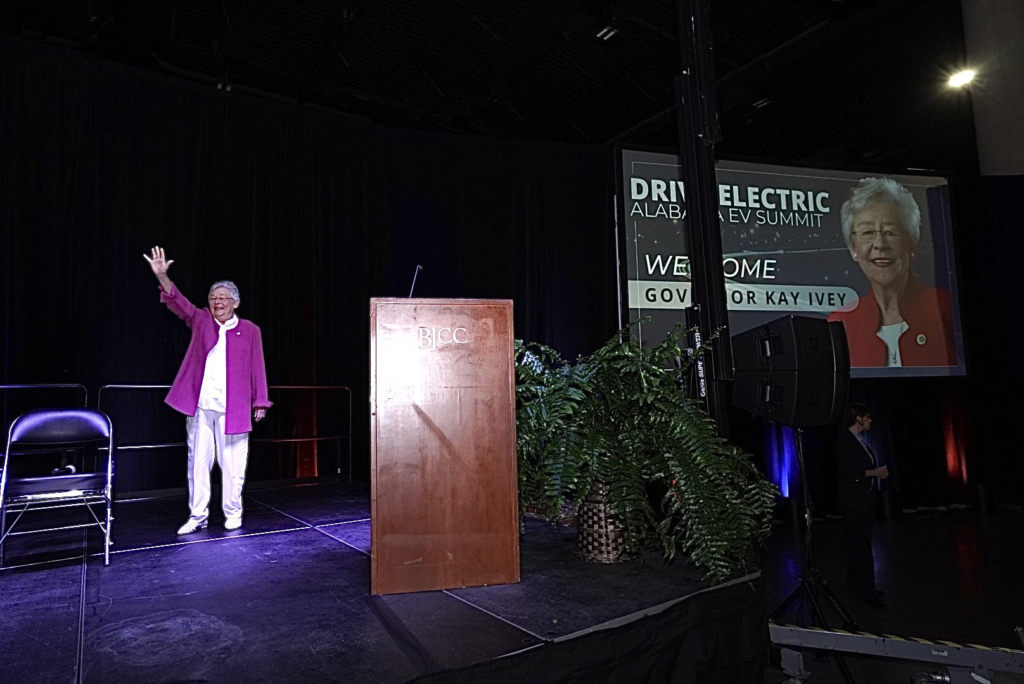
A summit was held in Birmingham on electric vehicle technology in Birmingham. Alabama Governor Kay Ivey headlined the EV summit, and other elected officials attended the event. Representatives from the major automotive manufacturers and suppliers and Alabama were also there. “Over the course of the last thirty years or so, Alabama has gone from not being on the map in the automotive sector to being an industry giant,” Gov. Ivey stated. “Today, we are one of America’s top five producers and exporters of cars and light trucks. Like our college football, we’re proud of the standard of excellence we set with our automotive industry, but it’s no secret that this is an industry changing by the day. In the last several years, we’ve seen an entirely new market emerge for many automotive manufacturers, and it’s clear that EVs are on the rise and will continue to gain popularity among drivers.” The inaugural Drive Electric Alabama EV Summit was held at the Birmingham Jefferson Convention Complex (BJCC) and featured discussions about electric vehicle initiatives in Alabama and provided information about charging infrastructure and other EV-related topics. “We are here to promote our automobile industry, and if EVs are the direction the industry is going in, then we want to do everything we can do to help make sure the jobs and the economic investment of this emerging industry come to Alabama, instead of to our neighboring states,” said Alabama Department of Economic Affairs (ADECA) Director Kenneth Boswell. ADECA is the lead agency in the Drive Electric Alabama initiative. This is a statewide coalition promoting the adoption of electric vehicles. Ron Davis is the President of the Alabama Automotive Manufacturers Association. “Virtually every major automaker around the globe has announced plans to electrify its fleet,” Davis said. “Automobile manufacturers clearly see EVs as the future of the industry – that’s why they’re pouring billions of dollars into research and development. As the number four auto exporting state, Alabama’s automobile manufacturing sector has a large impact on Alabama’s economy and employs tens of thousands of Alabamians with good-paying jobs. It is important that Alabama stays competitive so that the next generation of automobiles are built here instead of in neighboring states.” “Our foundation is strong, but we must continue to lay the groundwork for tomorrow, and that starts right here, right now,” Gov. Ivey said. Summit activities included panel discussions, vendor booths, and seminars focused on state and federal grants available in Alabama to install EV charging infrastructure. Generations of Alabamians have driven internal combustion engine automobiles since the Ford Model T, the Chevrolet C series, and the Overland Model 38. Industry experts expect that to change. “Electric vehicles also make financial sense for consumers, especially now with gas prices skyrocketing at the pump. Owning an EV also means major savings on maintenance costs, with the average EV driver saving anywhere from $6,000-$10,000 over the life of the vehicle,” Davis said. “As EV technology advances, the performance margin between electric cars and gas-powered vehicles becomes greater, as do other metrics such as selection of EVs, driving range, and availability of charging stations.” EV initiatives in the state of Alabama, charging technology, and EV charging’s effect on the power grid were subjects that came up during the discussions. To connect with the author of this story, or to comment, email brandonmreporter@gmail.com.
Kay Ivey awards $26.6 million to communities to expand broadband access
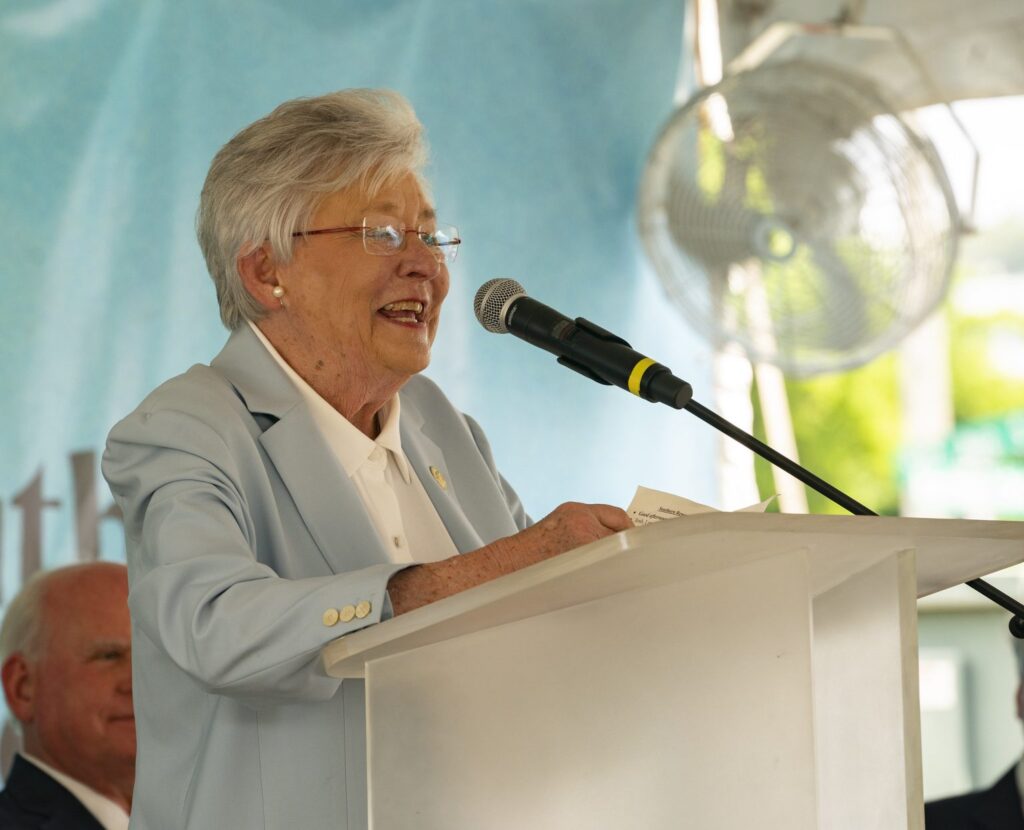
Gov. Kay Ivey announced today that more than $26 million in state funds have been awarded to provide broadband services in numerous locations throughout Alabama. The nine grants were awarded to broadband providers across the state. Once work is completed, the expanded broadband service will provide the capability to serve nearly 15,000 additional households, businesses, and public facilities, including schools and police, and fire services in areas without access to broadband service. Broadband providers supply access to broadband service, but households and businesses must still pay for connecting to the service. The expansion will also provide additional links to make it more feasible to supply future broadband service within those areas. “Alabama continues to make strides in providing reliable high-speed internet services for families and businesses throughout Alabama,” stated Governor Ivey. “I extend my thanks to legislators who realize the importance and the huge impact that access to broadband services mean for Alabama. I also thank the service providers for their willingness to be a part of this mission to change the lives of Alabamians.” The Alabama Department of Economic and Community Affairs (ADECA) administers the Broadband Accessibility Fund grants from state funds allocated by the Legislature. The grants are issued through ADECA’s Alabama Digital Expansion Division, which was created by legislation signed by Governor Ivey in 2021 focusing on broadband expansion in Alabama. According to ADECA, many Alabama homes and businesses receive less than the current federal definition of broadband service, which is 25 megabits per second (Mbps) download speed and three Mbps upload speed. “Having access to high-speed internet service can change the world for families in rural areas, particularly when it comes to education, health care, or running a business,” said ADECA Director Kenneth Boswell. “I am honored to have the trust that Governor Ivey and the Alabama Legislature have placed in ADECA to administer this program that is making a difference for people throughout the state.” Grants awarded and affected areas are: Blount/Etowah Counties Comcast Cable Communications – $1.32 million to provide access to 956 households, businesses, and public institutions in the towns and communities of Allgood, Altoona, Walnut Grove, Pana, Ellison Crossroads, and Redbud. Cherokee County Comcast Cable Communications – $4.74 million to provide broadband access to 2,778 households, businesses, and public buildings in the towns of Leesburg, Sand Rock, and the community of Anderson. Colbert County Comcast Cable Communications – $1.2 million to provide broadband access to 1,567 households, businesses, and public establishments near the town of Leighton and the communities of Ford City and Hatton, and an area near the town of Littleville. DeKalb County Farmers Telecommunications Corp. – $3.4 million to provide broadband access to 826 households, businesses, and public service institutions in or near the towns, cities, and communities of Mentone, Valley Head, Fort Payne, Cloudmont, Cloudland, Union Hill, Moon Lake, Ponderosa, Bankhead, Little River East Fork, Little River West Fork, Oakdale, Sylvania Gap, and DeSoto State Park. Jackson County Farmers Telecommunications Corp. – $4.37 million to provide broadband access to 1,818 households, businesses, and public buildings, including all or parts of the towns and communities of Dutton, Section, Langston, Powell, Macedonia, Davistown, Pleasant View, Hodge, and Hancock Crossing. Lauderdale County Spectrum Southeast – $2.31 million to provide broadband access near the town of Waterloo. The project will make high-speed internet available to 2,267 households, businesses, and public institutions. Mobile County Comcast Cable Communications – $686,298 to provide broadband access to 438 households, businesses, and public institutions in the communities of Alabama Port and Mon Louis. St. Clair County Comcast Cable Communications – $3.63 million to provide broadband access to 2,104 households, businesses, and public institutions in an area adjacent to the town of Ragland. Walker County Spectrum Southeast – $4.95 million to provide broadband access for 2,097 households, businesses, and public institutions in the areas of the towns of Oakman and Nauvoo.
Alabama investing in safety of state troopers
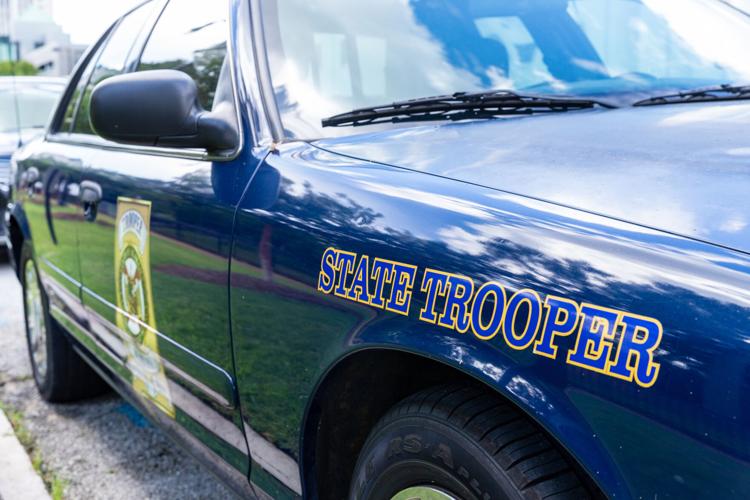
Troopers within the Alabama Law Enforcement Agency are expected to benefit from a new investment. Alabama has awarded a $20,365 grant to the Alabama Law Enforcement Agency, Gov. Kay Ivey said, that will be used to buy new bulletproof vests. The grant funding comes from dollars awarded to the state by the U.S. Department of Justice. Ivey said it was “imperative” to provide additional protection for state troopers. “I cannot say thank you enough to our state troopers and all law enforcement officers in Alabama who put their lives on the line when they put on that badge,” Ivey said in a release. “It is my prayer that no officers are injured or worse because of someone’s senseless and selfish actions. These vests will provide an added layer of protection when our officers enter potentially dangerous situations.” According to the release, the Alabama Department of Economic and Community Affairs will administer the grant from funds to give law enforcement agencies the chance to buy or replace protection equipment for officers. “All of us feel tremendously saddened when an officer is injured or killed in the line of duty,” ADECA Director Kenneth Boswell said in a release. “ According to the release, the agency provides an array of programs supporting law enforcement, in addition to victim programs, economic development, water resource management, energy conservation, and recreation. Republished with the permission of The Center Square.
Kay Ivey awards grants to support statewide agencies that assist domestic violence victims
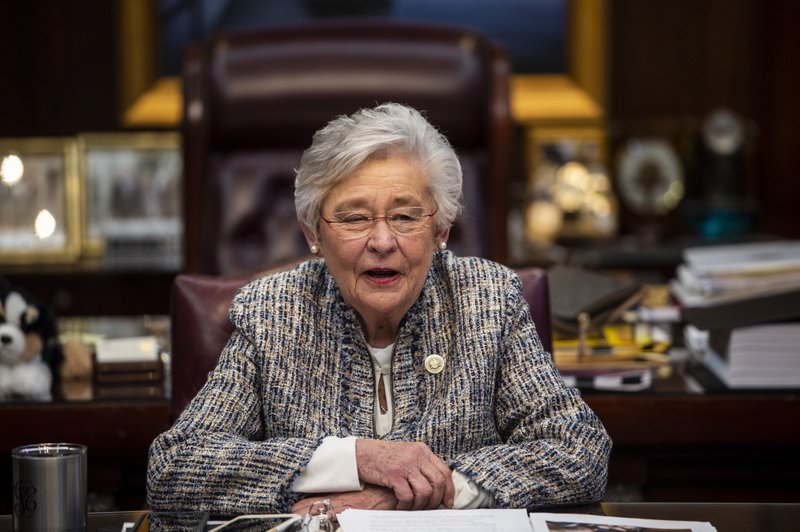
Gov. Kay Ivey has awarded grants totaling $316,000 to help provide training and resources that ensure victims of domestic violence have access to professional assistance through local law enforcement and nonprofit agencies. The Alabama Coalition Against Rape and the Alabama Coalition Against Domestic Violence will receive $158,000 each to train the staff of local law enforcement agencies, health care organizations, courts, and domestic violence shelters to recognize the signs of abuse and respond more effectively to domestic and dating violence as well as sexual assault. “Domestic violence and sexual assault affect too many Alabamians, and those investigating cases or helping victims should have access to top-notch training when needed,” Gov. Ivey stated. “I am pleased to support these efforts, which will help investigators, prosecutors, shelter staff, and, most importantly, victims.” The Alabama Department of Economic and Community Affairs is administering the grants from funds made available by the U.S. Department of Justice. ADECA administers a wide range of programs that support law enforcement, economic development, infrastructure upgrades, recreation, energy conservation, and water resources management. “ADECA shares Gov. Ivey’s dedication to helping victims of domestic abuse by making sure those who assist them have the best training and resources available,” ADECA Director Kenneth Boswell said.
ADECA says Alabama broadband plans are nearly ready for approval

The Alabama Department of Economic and Community Affairs (ADECA) was tasked with expanding broadband in the state prior to the pandemic, but COVID-19 revealed the necessity for expanding high-speed internet and has brought federal funds and increased urgency. ADECA Director Kenneth Boswell told Alabama’s economic developers the state is ready to spend $85 million in America Rescue Plan Act (ARPA) funds to expand broadband in the state and is seeking nearly $200 million more in Alabama’s Capital Projects Fund for further expansion. Speaking at the Economic Development Association of Alabama’s 2022 Summer Conference, Boswell said Alabama Gov. Kay Ivey first sought to work broadband into ADECA’s mission in 2017. The Alabama Rural Broadband Coalition pushed for legislation in 2019. That legislation eventually passed, and Ivey signed it into law in July 2021. The ARPA funding was a response to the pandemic when quarantines exposed the need for connectivity for people working from home, doing distance learning for school, and needing telemedicine for health care. “(The pandemic) magnified how bad that we needed it,” Boswell said. “It’s quality of life, it’s health care, it’s education – in today’s world, broadband impacts and affects us in every way, shape, form, and fashion.” Boswell said there is a need for $4 billion to $6 billion to expand broadband in the state, but two plans are at least a start. Companies like C Spire, Point Broadband, and Tombigbee Communications have been working with Alabama Power and others to bridge the state’s digital divide since 2019. Boswell said systems with the infrastructure and networks have the main lines of access – known as the “first mile” – and local providers can connect homes and businesses with what is known as the “last mile.” The need is the “middle mile” between the two, and that is where ADECA plans to spend the $85 million in ARPA funds. “We have five applications in-house right now, and we hope to have those graded, and an announcement made hopefully in the next two weeks,” Boswell said. The other ADECA plan seeks to use funds from the state. “Our second process is the actual Capital Projects Fund with $191 million,” Boswell said. “We have the plan complete. We’re doing all of our checks and balances as we speak. We will submit that to (the Alabama Department of) Commerce. They have up to a year to actually approve the plan, but we’re hoping that because of our advancements with our plan program that we will actually get that done quicker, by hopefully six months.” Those expenditures are in addition to the billions more being spent by private companies helping to expand broadband throughout Alabama. Learn more about Alabama Power’s Economic and Community Development initiatives at AmazingAlabama.com. Republished with the permission of Alabama NewsCenter.
Grants to benefit Alabama domestic violence victims

Combating domestic violence and protecting victims in southwest Alabama is the focus of the distribution of state funds. Republican Gov. Kay Ivey announced $131,000 in grants are being distributed to a trio of agencies that will be aimed at supporting efforts to arrest and prosecute domestic violence offenders while training officers on how to respond to those calls. “Domestic violence has no place in society because of the harm done to victims,” Ivey said in the release. “These grants will help provide funds necessary to ensure those who commit these offenses are punished and those who are victims have a safe place to turn.” Funding, according to the release, will be used to ensure victims of domestic violence are given resources to help them elude the often-violent situations. According to the release, the funds will be distributed through the Alabama Department of Economic and Community Affairs, with funding streaming from the U.S. Department of Justice. “ADECA joins Governor Ivey in supporting these agencies and the services they provide to help victims and to assist in prosecuting abusers,” ADECA Director Kenneth Boswell said in the release. According to the release, the Family Counseling Center of Mobile Inc. is set to receive $44,558 to support its community outreach initiatives. The funds will be used to promote awareness of domestic violence in Clarke, Mobile, and Washington counties. The funding will also be used by the counseling center to train law enforcement agencies, medical personnel, and other advocates to benefit victims. The Lighthouse, which is the Baldwin Family Violence Shelter, is scheduled to receive $33,000 the organization will use to establish the Lighthouse Court Advocacy Program. The program, according to the release, aids domestic violence victims as they navigate through the legal system as offenders are being prosecuted. The agency, according to the release, serves Baldwin, Conecuh, Escambia, and Monroe counties. It has a crisis hotline and a shelter. In Escambia County, the county commission will receive $53,200, according to the release, that will be used to fund the county’s domestic violence crime unit. The law enforcement arm works with victim service organizations while investigating and prosecuting domestic violence cases. Republished with the permission of The Center Square.
Alabama to receive nearly $312 million to aid in Hurricane Sally, Zeta recovery

Almost $312 million in Community Development Block Grant (CDBG) funds have been allocated to Alabama for recovery from Hurricanes Sally and Zeta, two hurricanes that battered the coastal areas of the state in fall 2020. Hurricane Sally made landfall on September 16, 2020, in Gulf Shores as a category 2 hurricane. Hurricane Zeta made landfall on October 28, 2020, in Louisiana and quickly crossed near coastal Alabama. Both storms caused significant wind and storm-surge damage. The U.S. Department of Housing and Urban Development (HUD) allocated the CDBG Disaster Recovery funds totaling $311,732,000 to Alabama as part of the Disaster Relief Supplemental Appropriations Act 2022. The funds will be managed by the Alabama Department of Economic and Community Affairs (ADECA). A majority of the funds will be given to areas including all of Mobile and Baldwin counties as well as the 36502 zip code in western Escambia County. HUD made the determination based on data from Federal Emergency Management Agency. Gov. Kay Ivey said the funding would help areas with long-term recovery efforts. “Natural disasters like Sally and Zeta may test our resolve, but I have seen the resiliency of Alabama and her people time and time again as they recover, rebuild and come back stronger than ever,” Gov. Ivey stated. “These funds will provide a boost to long-term recovery efforts in the communities affected by these disasters.” In the coming months, ADECA will lead public meetings to gather feedback, and the final plan will include details on the types of recovery projects, eligibility for local governments, and the application process. After the plan is approved by HUD, ADECA will begin the application process. “Community Development Block Grants do so much to help Alabama communities complete needed projects that they otherwise would not be able to afford, and that need becomes even greater when a community is recovering from an unexpected natural disaster,” ADECA Director Kenneth Boswell commented. “ADECA is pleased to play a role with Governor Ivey in this funding process, and we will work in the coming months to develop a clear action plan for deploying the grants in an effective manner.”
Kay Ivey announces $250k in grants to bolster public safety and fund law enforcement

Gov. Kay Ivey has awarded more than $250,000 to fund public safety and law enforcement across the state. These awards will aid in improving public safety and upgrading equipment in 12 Alabama jurisdictions. “In Alabama, we back our men and women in blue. I am proud to continue directing funds to these folks who are out there protecting our communities every single day,” said Governor Ivey. “Our law enforcement members put their lives on the line, and it is important we continue doing what we can to support them. I know these funds will go a long way in bolstering our public safety efforts.” The Alabama Department of Economic and Community Affairs (ADECA) will administer the awards with funds supplied to the state through the U.S. Department of Justice. ADECA administers a wide range of programs that support law enforcement, victim programs, economic development, water resource management, energy conservation, and recreation. “ADECA stands with Governor Ivey in her appreciation of our law enforcement officers and how much they mean to our communities,” said ADECA Director Kenneth Boswell. “We are pleased to be a part of the process that equips officers to perform their duties safely and effectively.” Those awarded grants are: Jackson County – $24,000 to enable the Jackson County Sheriff’s Department to purchase bullet-proof vests. Centre – $17,687 to purchase electronic stun guns for the Centre Police Department. Parrish – $23,945 for the Parrish Police Department to purchase laptop computers for patrol vehicles. Irondale – $23,899 to purchase miscellaneous public safety equipment for the Irondale Police Department. Jemison – $16,210 to enable the Jemison Police Department to purchase electronic stun guns, weapons, and alcohol-detection breath analyzers. Tallapoosa County – $24,000 to enable the Tallapoosa County Sheriff’s Department to purchase defibrillators to assist patients in cardiac arrest. Autauga County – $23,800 to enable the Autauga County Sheriff’s Department to buy laptop computers for patrol vehicles. Prattville – $24,000 to help the Prattville Police Department to purchase portable radios compliant with a new and now widely used means of radio communications. Coosada – $23,183 to purchase weapons, radar devices, and miscellaneous equipment for the Coosada Police Department. Butler County – $24,000 to purchase laptop computers for patrol vehicles for the Butler County Sheriff’s Department. Geneva County – $23,726 to upgrade equipment in Geneva County Sheriff’s Department vehicles. Fairhope– $24,000 to purchase a patrol vehicle for the Fairhope Police Department.
Kay Ivey awards $2.6 million in grants to aid victims of domestic violence
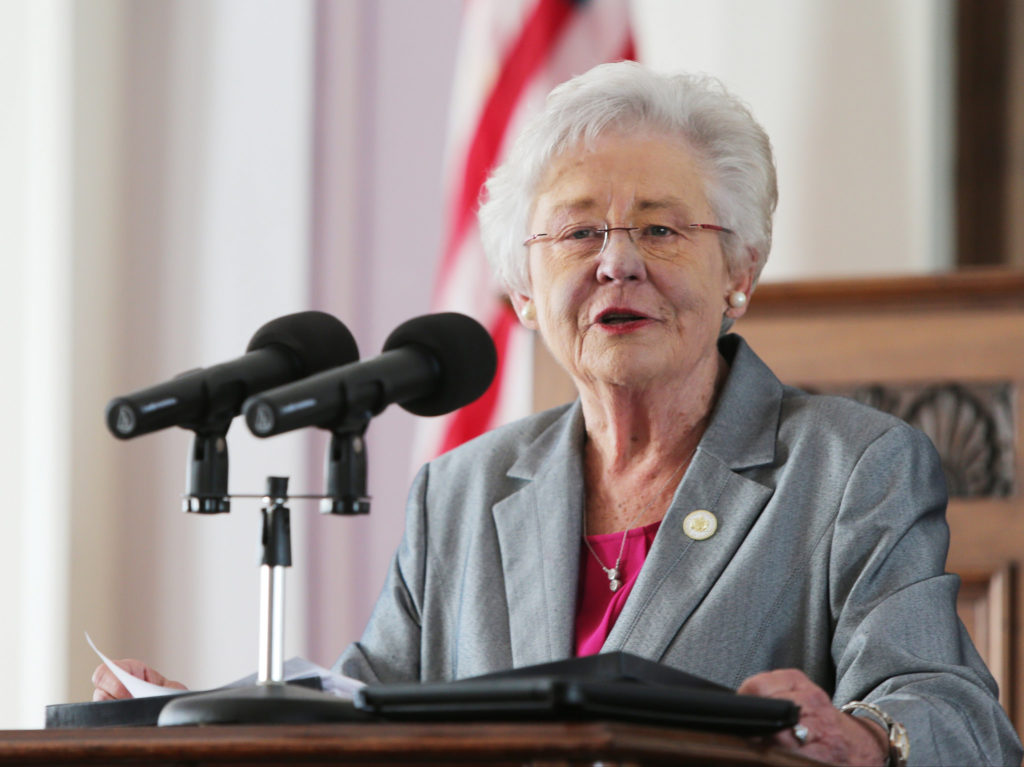
Governor Kay Ivey has awarded $2.6 million in grants to the Alabama Coalition Against Domestic Violence and seven nonprofit agencies that serve victims in their communities. The funds will assist victims of domestic violence as they escape from abusive situations and rebuild their lives. Ivey commended the efforts of these organizations to help victims of domestic violence. “Domestic violence is a crime that inflicts physical and emotional abuse with long-ranging effects, so victims need access to professional help to begin the recovery process,” Ivey stated. “I commend these organizations for providing compassionate assistance to victims at a time they need it the most and for offering domestic-violence education and prevention programs.” The Alabama Department of Economic and Community Affairs (ADECA) administers the grants from funds made available to Alabama by the U.S. Department of Justice and the U.S. Department of Health and Human Services. ADECA administers a wide range of programs that support law enforcement, victim services, economic development, broadband expansion, water resources management, energy conservation, and recreation. “With the proper support, those who have unfortunately been victimized by domestic violence can begin taking steps to a brighter and more hopeful future,” ADECA Director Kenneth Boswell said. “ADECA joins Gov. Ivey in support of these organizations and their important work in communities across Alabama.” Gov. Ivey has awarded the following funds: Alabama Coalition Against Domestic Violence (statewide): $175,000 from the state General Fund to support a statewide domestic violence hotline as well as support the 16 local organizations that provide direct assistance to victims across the state. The coalition will use an additional $70,000 grant for its Economic Justice Project, which seeks to reduce the impact of economic abuse on victims of domestic violence. Safeplace Inc. (Florence): $1.4 million to provide emergency shelter, counseling, assistance with navigating the criminal justice system and other services to victims in Colbert, Franklin, Lauderdale, Lawrence, Marion and Winston counties. YWCA Central Alabama (Birmingham): $135,000 for awareness, education and prevention programs in Blount, Jefferson and St. Clair counties. The agency also provides emergency shelter and other assistance to victims. Turning Point (Tuscaloosa): $45,000 to provide advocacy, emergency shelter, counseling and other assistance to victims in Bibb, Fayette, Greene, Hale, Lamar, Marengo, Pickens, Sumter and Tuscaloosa counties. SABRA Sanctuary Inc. (Selma): $32,810 for domestic violence prevention and education programs in schools and communities in Dallas, Greene, Marengo, Perry, Sumter and Wilcox counties. House of Ruth (Dothan): $456,720 to provide emergency shelter, advocacy, support groups and other assistance to victims in Barbour, Bullock, Coffee, Covington, Dale, Geneva, Henry, Houston and Pike counties. Family Counseling Center of Mobile Inc. (Mobile): $219,000 to assist victims with navigating the criminal justice system, emergency shelter and housing, counseling and other services. The organization serves Clarke, Mobile and Washington counties. The Lighthouse – Baldwin Family Violence Shelter (Robertsdale): $67,973 to provide advocacy, emergency shelter, support groups and other assistance to victims in Baldwin and Escambia counties.
$47 million in grants awarded to assist low-income families with utility costs

The Alabama Department of Economic and Community Affairs (ADECA) announced that Gov. Kay Ivey has awarded grants totaling nearly $47 million to help low-income households with utility costs during the cold winter and hot summer months. The grants will enable 18 community service agencies to provide emergency funding to help low-income families heat and cool their homes in 2022. “Alabama’s coldest and hottest times of the year hit many low-income residents particularly hard when they can struggle to pay their utility bills,” Gov. Ivey said. “These grants will provide extra funding to assist in lowering the costs for many of them so that they can stay warm in the winter and cool in the summer.” ADECA will administer the grants from funds made available by the U.S. Department of Health and Human Services. ADECA administers an array of programs supporting law enforcement and traffic safety, economic development, energy conservation, water resource management, and recreation development. “ADECA stands with Gov. Ivey in supporting those who need help most during our hottest and coldest months,” ADECA Director Kenneth Boswell said. “These partnerships with local community agencies ensure that those who truly need assistance will receive emergency help with heating and cooling their homes.” Below is a list of each grant, the recipient agency, counties served, and the agency telephone number: $1.34 million to Community Action Agency of Northwest Alabama Inc. (Colbert, Franklin and Lauderdale) 256-766-4330 $2.46 million to Community Action Partnership of Middle Alabama Inc. (Autauga, Chilton, Elmore and Shelby) 205-755-1204 $1.24 million to Community Action Committee Inc. of Chambers-Tallapoosa-Coosa (Chambers, Coosa and Tallapoosa) 256-825-4287 $1.39 million to Alabama Council on Human Relations Inc. (Lee) 334-821-8336 $3.62 million to Community Action Partnership of Huntsville-Madison and Limestone Counties Inc. (Madison and Limestone) 256-851-9800 $5.12 million to Mobile Community Action Inc. (Mobile and Washington) 251-457-5700 $2.57 million to Montgomery Community Action Committee and Community Development Corporation Inc. (Montgomery) 334-263-3474 $3.22 million to Community Action Partnership of North Alabama Inc. (Cullman, Lawrence, Marion, Morgan and Winston) 256-355-7843 $3.9 million to Community Action Agency of Northeast Alabama Inc. (Blount, Cherokee, DeKalb, Jackson, Marshall and St. Clair) 256-638-4430 $3.12 million to Organized Community Action Program Inc. (Bullock, Butler, Covington, Crenshaw, Dale, Lowndes and Pike) 334-566-1712 $3.31 million to Community Action Agency of South Alabama (Baldwin, Clarke, Conecuh, Escambia, Marengo, Monroe and Wilcox) 251-626-2646 $2.28 million to Community Action Agency of Talladega, Clay, Randolph, Calhoun and Cleburne (Calhoun, Clay, Cleburne, Randolph and Talladega) 256-362-6611 $5.97 million to Community Service Programs of West Alabama Inc. (Bibb, Choctaw, Dallas, Fayette, Greene, Hale, Lamar, Perry, Sumter and Tuscaloosa) 205-752-5429 $1 million to Walker County Community Action Agency Inc. (Walker County) 205-221-4010 $3.06 million to Southeast Alabama Community Action Partnership Inc. (Barbour, Coffee, Geneva, Henry and Houston) 334-347-0881 $510,922 to Pickens County Community Action Committee and Community Development Corporation Inc. (Pickens) 205-367-1283 $1.2 million to Macon-Russell Community Action Agency Inc. (Macon and Russell) 334-727-6100 $1.47 million to Community Action of Etowah County Inc. (Etowah) 256-546-9271
Kay Ivey awards $18 million in grants to improve public water services
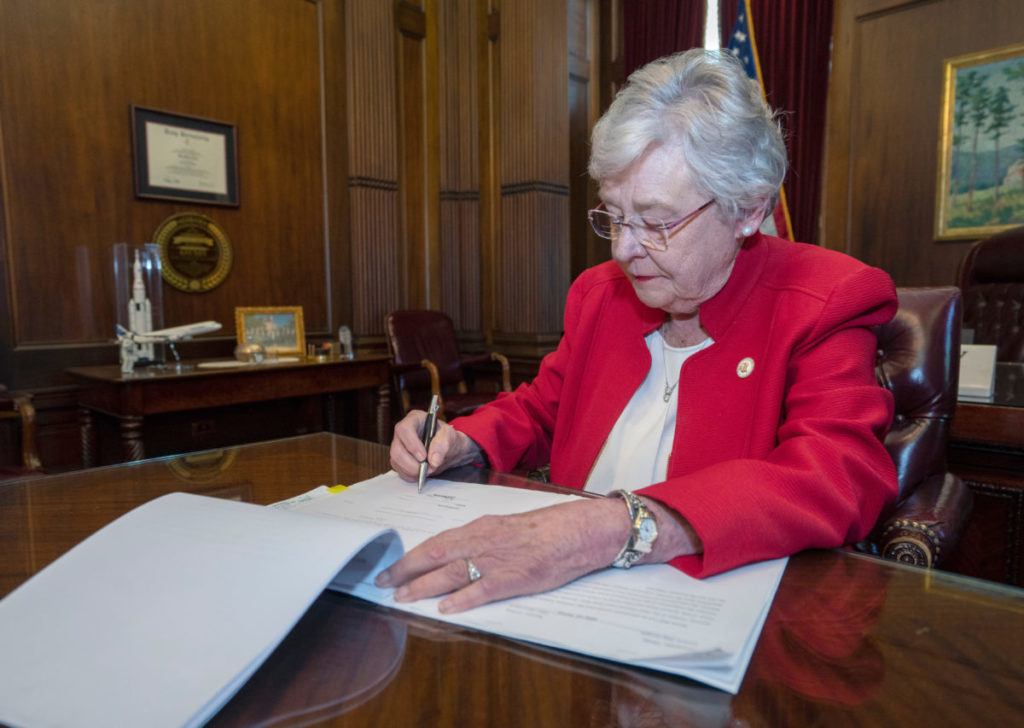
Gov. Kay Ivey has awarded $18.2 million to provide improvements in more than 50 Alabama towns, cities, and counties. The Community Development Block Grants (CDBG) will help local governments provide public water service to households, repair damaged streets and roads, improve sewer systems, and more. The governor awarded the grants at a ceremony Thursday afternoon in the State Capitol. “Community Development Block Grants are a means in which local governments can address some of their more pressing needs,” stated Ivey. “I am pleased to award these grants, and I commend those local officials who recognized those needs and took the time and effort to seek an answer through this grant program.” The CDBG program in Alabama is awarded annually on a competitive basis in several categories: small city (population 2,999 or less), large city (population 3,000 or more), county and community enhancement. Additionally, planning grants are awarded to help local governments examine and address needs. The Alabama Department of Economic and Community Affairs (ADECA) will administer the grants from funds made available by the U.S. Department of Housing and Urban Development. ADECA administers an array of programs supporting law enforcement and traffic safety, economic development, energy conservation, water resource management, and recreation development. “ADECA is pleased to join with Gov. Ivey in this grant program that annually helps Alabama towns, cities and counties obtain financial assistance for projects that benefit their communities,” ADECA Director Kenneth Boswell said. “We look forward to seeing the positive impacts that these projects have on the quality of life for residents of these communities.” Grants awarded and projects (grouped by geographical region) are: North Alabama Altoona (Etowah County) – $293,024 to replace a city water line that because of frequent breakages is responsible for most of the major disruptions in city water service. Altoona (Etowah County) – $25,000 for a planning grant to outline the city’s goals and future needs. Athens (Limestone County) – $500,000 for drainage and street improvements and dilapidated-building demolition in the neighborhood around Vine Street. Attalla (Etowah County)- $500,000 to replace or rehabilitate several sections of the town’s sewer lines. Blount County – $300,000 for street and drainage improvements along Philadelphia, Lehigh, and Reid Schoolhouse roads southwest of Locust Fork. Brilliant (Marion County) – $349,900 to upgrade sewer lines and pump stations to improve service. Crossville (DeKalb County) – $40,000 for a planning grant to update mapping of the town’s water system. Cullman (Cullman County)- $500,000 for street and drainage improvements in the Warnke Road neighborhoods. Cullman County – $400,000 to resurface and provide drainage improvements along Cullman County Road 18 near the Bremen community. Douglas (Marshall County)- $350,000 for improvements to the town’s water system and street and drainage improvements along Plunkett Drive, Moon Road and part of Otinger Drive. Falkville (Morgan County) -$350,000 for drainage improvements in an area bounded by East Pike Road, East Pine Street, Patton Street and Douglas Road. Gurley (Madison County) – $350,000 to replace or rehabilitate nearly 160 manhole components in the town’s sewer system. Hillsboro (Lawrence County) – $350,000 for drainage improvements along Oakdale Avenue and its spur roads. Jasper (Walker County) – $500,000 for water, sewer, and street improvements along multiple streets in the 19th Street neighborhood. Littleville (Colbert County) – $350,000 to replace or rehabilitate sewer lines and manholes along U.S. Highway 43. New Hope (Madison County) – $350,000 to repair and replace city sewer lines and some household lines along Spring, Ellett, and Whitt streets, West Avenue, and a part of College Avenue. Owens Cross Roads (Madison County) – $350,000 for sewer improvements in the neighborhood along Brockway Road. Parrish (Walker County) – $300,000 for street and drainage improvements involving Atkins-Edison Street and New Baltimore and Shady Grove roads. Powell (DeKalb County) – $148,000 to replace a dilapidated play area with new playground equipment. Russellville (Franklin County) – $300,000 to demolish 11 dilapidated structures and remove debris. Sylvania (DeKalb County) – $300,000 to repair and resurface Delta, Spear, and Horizon streets in the Sylvania Estates neighborhood. Walker County – $260,000 for handicap access improvements for the Walker County Courthouse in Jasper. North Central Alabama Fruithurst (Cleburne County) – $217,006 to resurface all or part of School Street, Third Street West, and Northeast Avenue. Fruithurst (Cleburne County) – $12,000 for a planning grant. Heflin (Cleburne County) – $500,000 to rehabilitate the town’s main sewer line which is responsible for transporting sewage to the city’s wastewater plant. Wedowee (Randolph County) – $350,000 to replace sewer lines to better control sewage inflow. South Central Alabama Alexander City (Tallapoosa County) – $500,000 to replace antiquated water lines to improve flow and pressure and add fire hydrants. Bullock County – $400,000 to resurface multiple streets in the Ponderosa community. Camden (Wilcox County) – $350,000 to upgrade sewer lines in the Westgate community. Choctaw County – $400,000 to rehabilitate and resurface 5.1 miles of Bailey Road southwest of Butler. Dadeville (Tallapoosa County) – $500,000 for dismantling and clearing 18 dilapidated buildings. Eclectic (Elmore County) – $300,000 to construct a new playground, adult fitness area, and amenities at the site of Panther Palace Playground. Epes (Sumter County) – $343,773 for sewer improvements along Clark Miller Lane and Martin Luther King Drive (U.S. Highway 11). Faunsdale (Marengo County) – $300,000 to rehabilitate sidewalks including handicap accessibility modifications and add lighting in the town’s commercial district. Goodwater (Coosa County)- $300,000 to raze and remove debris of four dilapidated commercial buildings. LaFayette (Chambers County) – $450,000 for upgrades at the town’s water treatment plant. Lowndes County – $400,000 to resurface seven county roads. Macon County -$396,040 to resurface at least parts of 19 county roads. Perry County – $400,000 to extend public water availability in the Medline community. Wilcox County – $400,000 to improve drainage along four streets in the Meadowbrook Subdivision area. South Alabama Andalusia (Covington County) – $500,000 to replace water lines along North Cotton Street and Eighth Avenue and resurface those streets. Chatom (Washington County) -$350,000 to upgrade its wastewater treatment facility to ensure reliable service for residents. Enterprise (Coffee County) – $272,900 to demolish and clear 45 dilapidated buildings throughout the city. Evergreen (Conecuh County) – $500,000 to improve the town’s sewer system, including replacing an outdated lift station and inadequate sewer line. Flomaton (Escambia County) – $350,000 to renovate and upgrade the town’s


